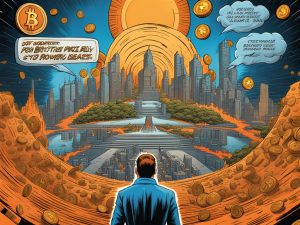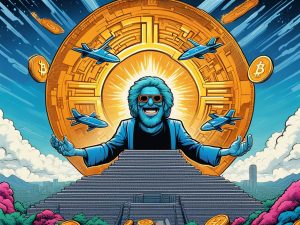Bitcoin’s Architecture as a Universal Financial Protocol
Former Meta and PayPal executive, David Marcus, believes that Bitcoin’s underlying technology has the potential to serve as the basis for a universal financial protocol on the internet. In a recent CNBC interview, Marcus, who is now the CEO of Lightspark, shared his unconventional vision for Bitcoin. Instead of solely being seen as a store of value, Marcus sees Bitcoin’s architecture as a foundation for a global payment network. He envisions building an overlay network on top of Bitcoin’s existing blockchain to facilitate more efficient transactions, leveraging its core attributes of decentralization and security. The goal is to provide a universally applicable protocol for financial transactions on the internet, addressing the current lack of standards in this space.
Technical Challenges and Lightspark’s Solution
While Marcus’s vision sounds promising, there are technical challenges to overcome. Bitcoin’s current architecture has limitations, including slow transaction speeds and high fees. To address these issues, Lightspark, Marcus’s new venture, aims to build an overlay network on top of Bitcoin’s blockchain to make transactions more efficient. However, this endeavor presents multifaceted challenges both technically and from a regulatory standpoint. Nevertheless, Marcus is driven by his belief that the internet needs a universal protocol for financial transactions, and he sees Bitcoin’s technology as a potential solution.
Career Background and Regulatory Setbacks
Prior to his involvement with Lightspark, Marcus focused on broadening PayPal’s platform reach and enhancing user experience. He then moved to Facebook, where he led the ambitious Diem project (formerly known as Libra). The project aimed to create a stablecoin that would simplify financial transactions. However, it faced significant regulatory setbacks, particularly regarding global financial compliance.
Hot Take: Bitcoin’s Potential as a Global Payment Network
David Marcus, former executive at Meta and PayPal, believes that Bitcoin has the potential to be the foundation for a universal financial protocol on the internet. His vision diverges from the common perception of Bitcoin as a store of value and emphasizes its architecture as a global payment network. Building an overlay network on top of Bitcoin’s blockchain, as proposed by Marcus’s new venture Lightspark, aims to enable more efficient transactions while leveraging the decentralized and secure nature of Bitcoin. Although there are technical obstacles to overcome, Marcus sees Bitcoin’s technology as a potential solution to the lack of standards for financial transactions on the internet. His career background in enhancing user experience and facing regulatory challenges further adds to his credibility in this space.





 By
By

 By
By
 By
By

 By
By